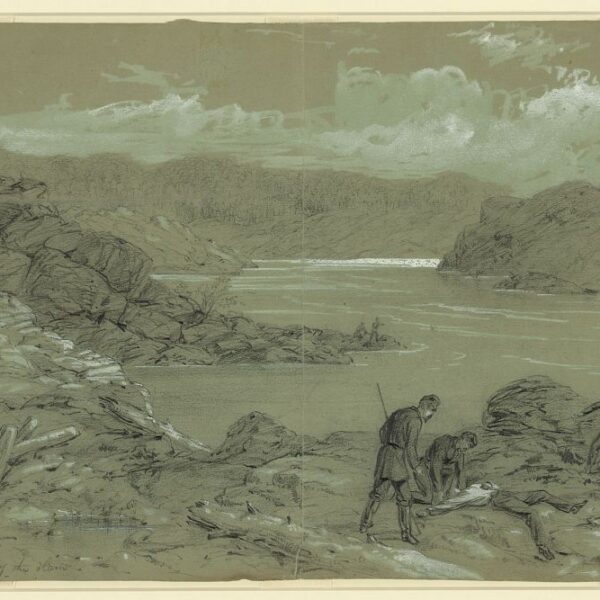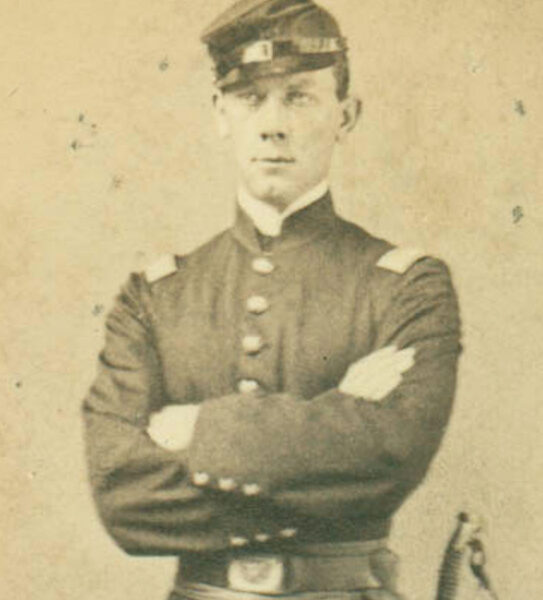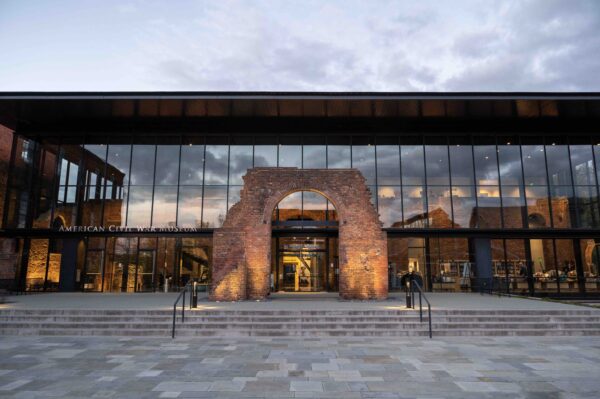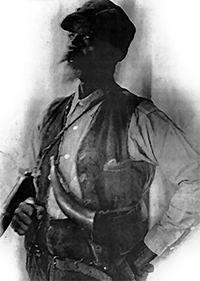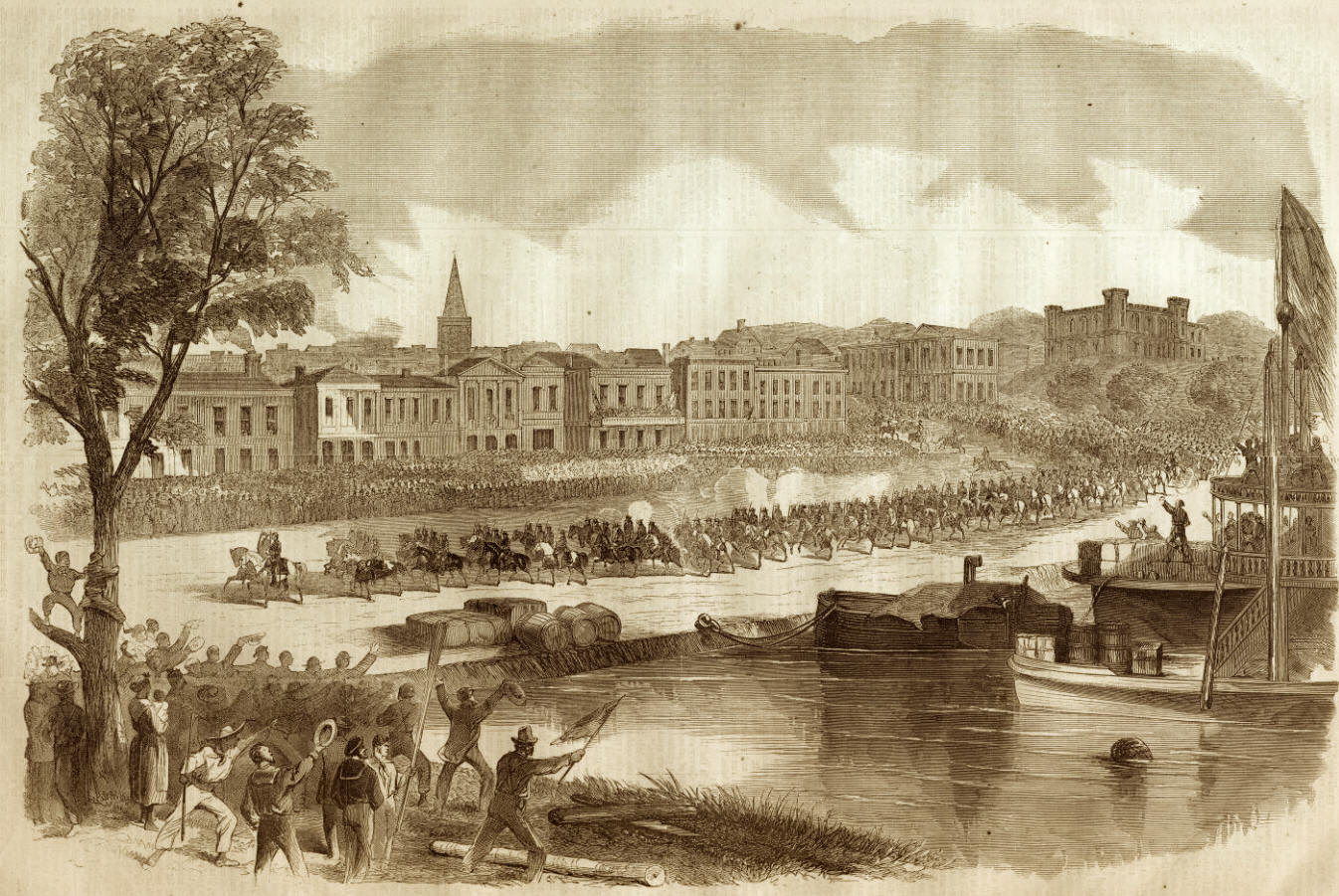
Union soldiers march through Baton Rouge in May 1863.
While on furlough in Baton Rouge in May 1863, Corporal James K. Hosmer of the 52nd Massachusetts Infantry volunteered to work in a Union army hospital that was tending to men wounded during the Siege of Port Hudson. Hosmer, who had been a pastor at a church in Deerfield, Massachusetts, before enlisting in September 1862, left a detailed account of the harrowing seven days he spent as a nurse, which is reproduced below.
Here began my week of hospital-work, a week of most profound and soul-touching experiences, a week when work went on from day-dawn to day-dawn almost without intermission; when new resources and new strength were developed in all who were there.
Without mattress or covering, I had been sleeping on the bare boards of the cabin, when the halting of the boat, and the roar of the fleet-guns in the river just ahead, awakened me. As the bow touched the shore, a slight, pleasant-faced gentleman, with nothing to denote his connection with the army but a little badge on his Panama-hat, came up the cabin-stairs.
“Where can I find Dr. L—, sir?”
“I am Dr. L—,” was his answer; and I presented my credentials. The doctor was in charge of the hospital at the landing. There were tents pitched; but they were filled with stores or with other men: so, for the night, I remained aboard the steamer; and, in spite of the cannonade, slept well.
I arose at dawn, —it was Sunday, the 24th of May, —and took the first view by daylight of my new location. The river, I found, was here divided, Prophet Island standing between the two branches of the stream. I could see the “Richmond” at the distance of about a mile and a half up the river, and was told that the remaining vessels of the fleet lay near her. Beyond the “Richmond” lay the threatening line of bluffs, on which were planted the rebel batteries; but from that distance they could not be seen.
Close at hand, the shore was so low as evidently to be covered by the river at high water. The soil gave evidence of having been lately submerged, though now it was dry. Dr. L—’s tents, two or three in number, were pitched in a grove of young saplings, in the rear of a great pile of ammunition and subsistence. Back of these, again, ran the road by which communication was maintained with the army. The “Kineo” lay at anchor a rod or two from shore; and up the bank a little way were tents, and three or four Parrott siege-guns of the largest caliber I have ever seen on wheels. The only building near was an old warehouse, which we tore to pieces for fuel.
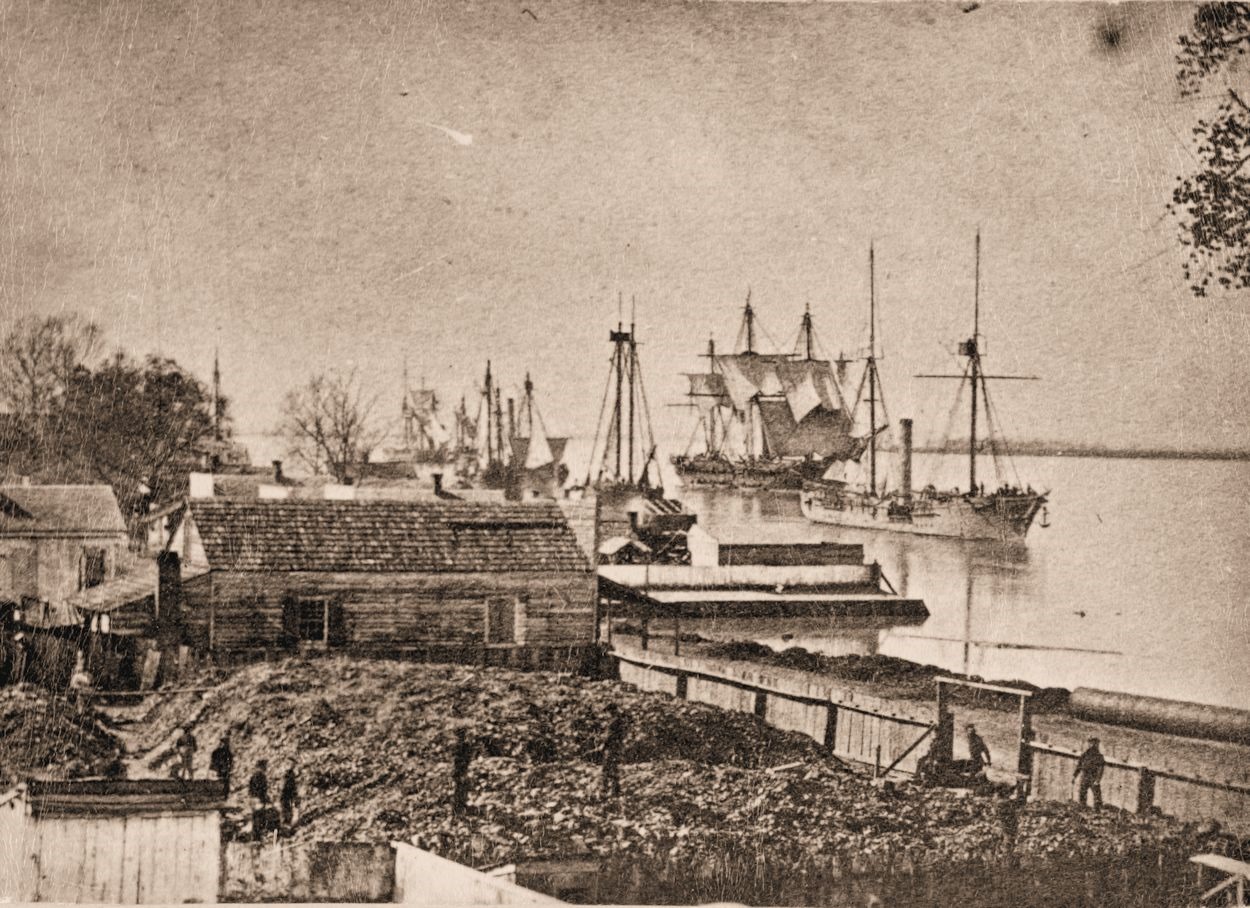
USS Kineo and USS Hartford at dock at Baton Rouge in 1863.
Breakfast was cooked among the saplings; and there I first met my fellow-nurses. There were two stout corporals of a Maine regiment, good-natured and bovine; a round-faced corporal of another regiment; a stout battery-man and ex-teamster from the Quincy quarries of the Fourth Massachusetts regiment; the skipper of a West-India trading-brig, who had come from Bangor to try his hand at war; &c. Most of them were convalescents from Baton Rouge, not yet recovered enough to rejoin their regiments, but considered fit for hospital-duty. So great was the want of men, that the sick were almost taken from their beds and set to work. There was also a hospital-steward, a good-looking, capable fellow, with his golden caduceus, embroidered upon green, just above his elbow. There was, besides, a functionary whom we called the commissary, whose business was to guard and deal out the stores.
A great battle might happen at any hour. Already many wounded had been brought in, and despatched to Baton Rouge, from the preliminary skirmishes; and it was high time for the doctor to complete his preparations. He collected us in line before him, and gave us his instructions. We were not to go from the landing: we were to pay most careful attention to the comfort of the wounded; and, if we were detailed to go to Baton Rouge with boat-loads of them, there must be perfect kindness and faithfulness.
There was plenty to be done. We could hear the sound of heavy guns at the front; and all the morning we were very busy pitching new tents, sweeping and policeing about the hospital, collecting fuel, and chopping down inconvenient trees. When I am with the regiment, owing to my profession, which is generally known, I am treated with some deference. Things have been made easy for me by the kindness of friends; and I am spared many of the rough knocks to which the rank and file in general are exposed. Here, however, I was unknown. I stood among the rest simply a corporal of infantry. No one knew me as a clergyman; we none of us knew each other’s antecedents and expectations. We were briskly ordered here and there. I was glad to see that I passed among the others for a pretty stout fellow; being set with the strongest to chop and dig and clean. I worked with a will; and believe I established myself that first day, in the good opinion of the doctor and the steward, as a pretty tolerable hand. Most of the nurses being convalescents, a good deal fell to the share of the two or three of us who called ourselves well.
At noon, a number of sick arrived from the front. We heard sharper firing. The “Kineo” weighing anchor, her crew, who all the morning had been on deck, in clean, fresh dresses, stripping off their shirts, began to make headway up stream to go into action. Presently we heard her eleven-inch gun close up under the batteries. During the afternoon, long trains of army-wagons took off commissary and ordnance stores; the useful mule-teams dragging through the light soil loads that would soon use up the stoutest horses. At the end of the afternoon, the medical director came up with Dr. F—, who is to be associated with Dr. L— in the conduct of the hospital. With these gentlemen came ice, lemons, soft bread, wine, &c.; which we got up to the tents, then went to work vigorously on ice-houses. The medical director went to the front, and brought back word, at dark, that the “news is good; we are closing in on them; the assault is impending, and we must be ready.”
Next day we finish our ice-houses. We get through, too, with our tent-pitching, putting up two large pavilions, capable of holding about sixty wounded, stretched out at length, with comfort, and more than that with crowding. At noon came in more of the sick, and the first wounded man since my arrival. We carry him on his stretcher out under the trees, where it is shady and cool; and I, anxious to be broken in as soon as possible, kneel down by the side of the hospital steward to learn the operations of dressing. This man had been shot through the leg in a skirmish; not a severe hurt, as compared with wounds often received. I moisten the bandages, dry and stiff with blood, until they unwind easily. We lay bare and gently wash the bullet-holes through the limb, apply fresh lint and clean bandages, and bring the man to rest under the tent. In the afternoon, we have arrivals of thirty or forty sick or wounded. The ambulances stop in the road; and we go down with stretchers, four men to each. Generally, the wounded are sadly wearied and jolted by the long ride over a rough road. They come with various hurts, shot in body, head, legs, and arms. As gently as we can, we move them from the wagons to the stretchers; then from the stretchers again to the pallets on the floors of the tents.
It grew dark while they were arriving. We moistened their bandages, gave them iced lemonade and punch, and brought them toast and tea from the cooks. One was a stout German sergeant, shot through the foot accidentally by a comrade. We had numbers of such cases. Several had lost an arm, the stump being done up in bloody bandages; many had had a hand or foot badly shattered. By candle-light, the surgeons made their rounds. At this depot, all that was intended was to refresh the patients, and transfer them comfortably to the boats for Baton Rouge. There convenient hospitals were prepared, and surgeons to attend them. Here it was the design only to dress such wounds as needed it at once, and perform such operations as were immediately pressing.
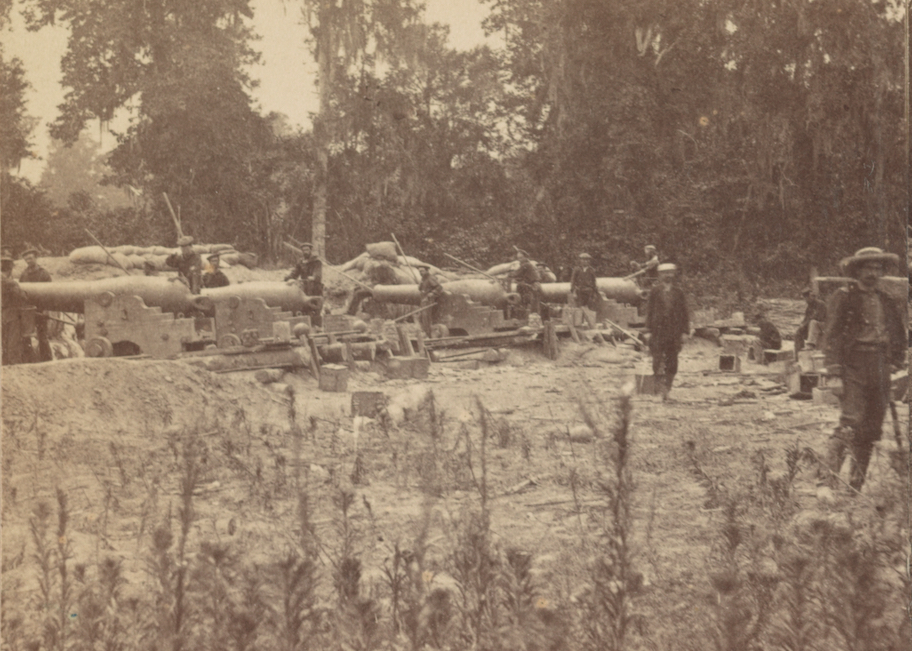
A Union battery at Port Hudson in June 1863.
This night, I saw a wound probed for the first time. The bullet had entered just above the knee. Dr. F— came in with his probe, a fine instrument of steel, with a small ball of ivory at the end. I shrank from seeing it done, but thought I must accustom myself to it, or I should be able to do nothing at all. The patient was a brave, easy fellow, who started coolly, in the operation, to hold the light for the doctor, himself. The pain was too great for that: but still he was smiling and unflinching through the whole of it; straightening up on his hands from his couch, and offering his leg to the instrument.
From evening it becomes night. The surgeons retire; and one by one the nurses drop off, until at length, long past midnight, only two or three of us are left. The candles burn low; the wounded sleep, or groan as their smarts and aches drive away slumber. Carefully and quietly we step from one to another, and soothe them as tenderly as we can. At last, we wake up some of the nurses who have slept; and, expecting a hard day when the sun rises, lay down for a few hours rest ourselves.
Tuesday morning, after all, opened with little to be done. Before I rose, the wounded we had been tending had been moved aboard a steamer, and were on their way to comfort. The ice-houses now were all filled. Among the stores were quantities of whiskey, wine, lemons, soft bread, lint, bandages, &c. The surgeons had their instruments in readiness; the cooks had convenient kitchens, and huge boilers for making soup, tea, and coffee. Negroes were procured to sweep out the great tents, clear out the bloody bandages and cotton, and lay beds, sweet and fresh, for the next lot of sufferers. The doctors were kind, and wished us to rest while we could. During the forenoon, I slept; at noon, dined light on soft bread and tea (for, during this whole week, our fare was rather light for our work); got a drink of ice-water from a barrel in front of the commissarys, and was entirely fresh again. Bed-ticks in great quantity were on hand. From the quarter master we got bales of hay, and stuffed the ticks; heaping up a great pile to use from. We got out mosquito-bars to protect the wounded from the flies; had pails, wash-basins, and sponges all in readiness; and, soon in the afternoon, the ambulances began to arrive.
The battle has not yet been fought. These are still only the victims of the preliminary skirmishes, and those who have been accidentally injured. The beds are spread in rows. The great hospital-tents stand one behind the other; the canvas between them, and, at either end, looped up high, so that the air can draw freely through. The beds lie in four long rows on the ground, from end to end, the outermost rows close down under the eaves, an aisle running down between. Beside ourselves, we have our stout negroes for help; and, one by one, the ambulances are emptied.
“Take them carefully, boys! Ambulance-driver, you are used to handling them. Get over from your seat in front, and manage the head of the poor prostrate fellow. Let one take the feet, as we slide him out; now a stout one, to catch him at the hips. Carefully, down upon the canvas! Stop groaning! Poor fellow! it is over.”
Here is one with foot mashed by a piece of shell. This one is struck in the calf. Here is one whose leg is gone. The bloody swathings are hot and stiff. We will moisten them with ice-cold water. Here is one struck in the groin: the ball has gone through, and been cut out of the haunch behind. He lives, is bright, and may get well. This cavalry-man is shot clear through, from hip to hip. He is stripped, and the bullet-holes on each side are plain. He lives too. What will not the human body endure? A solid shot has struck this cannoneer in the bowels. Mortally wounded he is. The doctor takes off the broad piece of cloth that covers the hurt, revealing the horrible mangling; then replaces it. There is nothing for him but a dose of morphine to deaden the pain. They have been hit everywhere. Hardly a muscle or bone or fibre of the human body but has been struck in one or another of this unfortunate company, lungs, shoulders and chest, arms and hands, neck, face, eyes; and, while I am moving a tall Zouave in his brilliant dress, the cloth upon his head drops off, as his shoulders are in my hands. The skull is cleft by a fragment of shell, apparently, deep down into the brain, whose inmost recesses are revealed in the bright sun. Yet he lives too!
All now are in the two tents. The ambulance-drivers go back to the cooks for their suppers; but our work is only begun. The doctors go rapidly from man to man. I follow Dr. L— with a pail of water, soon red and thick with blood, with which to moisten the dressings. Quickly, but pleasantly and quietly, he lays bare the most hideous hurts. I catch the lesson from him. Do not let the patient see an over-anxious face, nor hear too deep sympathy in the voice, lest it should alarm. Be cheerful and tender, and let tone and look give as much encouragement as possible.
Dr. L— has another assistant, a gentleman in citizen’s dress, of intellectual face, full of nerve, and ready-handed, who kneels at one side of the doctor, as I do at the other, holding the instruments. The light is not bright, and I have little leisure for any thing but the wounds; yet I find time to study this man some. He is Barclay, a young minister; here as a delegate of the Christian Commission. In a day or two, I know him better. So we go from bed to bed, stepping carefully among bandaged shoulders, and bloody stumps of legs and arms, and faces pale as the swathings that wrap the head above. Generally, the most severe wounds are not apparently painful; the sufferer lying benumbed, I suppose, by the severing of important nerves. Lacerations of the hands and feet appear to cause most agony. Again we work on, until the candles burn low; holding ice here, bathing a limb or back there, or holding tea to pale lips here. It is morning again, when I arouse a sleeper to take his turn, and give me a chance to sleep.
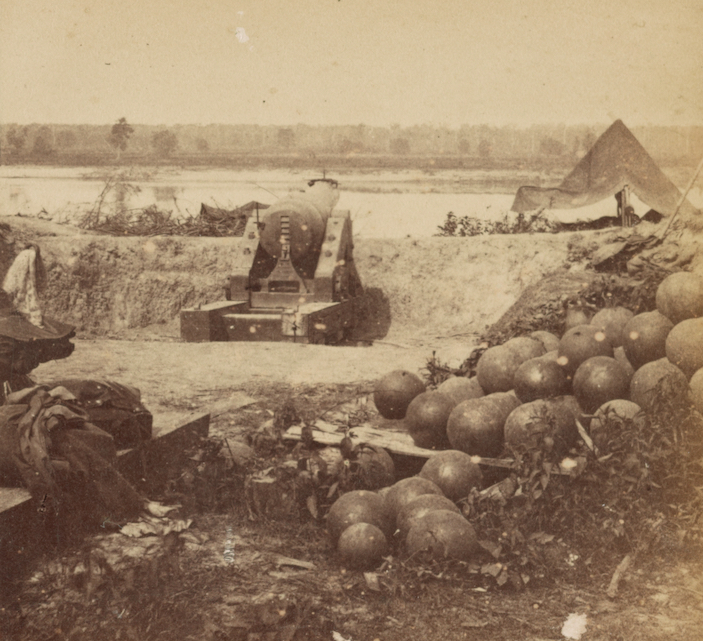
A cannon that formed part of the Confederate defenses at Port Hudson.
Through Wednesday morning, we hear a fiercer cannonade than before. A few sick come in from the front during the forenoon; but these, and the wounded we had the night previous, are speedily sent to Baton Rouge. I catch a little sleep after dinner; and, when I awake, am set upon a dreadful task. It is to watch the cannoneer, wounded in the bowels. He was struck on Saturday. It is Wednesday evening, and he is still alive, but with his wound and whole body in a condition not to be described. He lies stripped for greater coolness, only covered with a netting. Somebody must watch beside him. He is delirious, but wants water and to be fanned; and, loathsome as he is, an attendant must be at his side. He tears the cloth from his horrible wound, and I must replace it. I must stand ready to catch his hands. He is decomposing like a corpse, although life yet remains. Toward midnight, he receives a still heavier dose of morphine, and I can leave. I hear that he died before morning.
While I have been at this task, much has been doing. Early after dark, word comes from the front, of the repulse and terrible loss of the storming party; and the surgeons are warned of the approach of a large number of wounded. We hear of the fall of generals and colonels, and rank and file without number; and close upon the heels of the intelligence follow the ambulances, loaded as never before with hastily dressed wounded from the field-hospitals in front. It is about ten o’clock when I go aboard the “Iberville” at the landing; to which the ambulances are transferring their loads at once, instead of leaving them first in our tents. As I enter the cabin-door, the long, handsome saloon, from end to end, is filled with the victims of the battle just fought. From the rich, bronze chandeliers, light falls upon a ghastly sight, all the ghastlier from contrast with the elegance about. I can hardly step among the prostrate and gory company. And so they lie all through the long perspective, the great mirror at the farther end repeating it all anew; the stains upon their wrappings, about heads and limbs and bodies, red as the figures of the rich carpet upon which they lie.
At the farther end, just in front of the mirror, lie a Zouave major, two colonels, an adjutant of a Maine regiment, then the brave and unfortunate young colonel of the Massachusetts Forty-ninth. He lost a leg at Ball’s Bluff. Now he is shot through the other foot and through the wrist. Only twenty-three! I watch his face and figure…. There is no sign of suffering upon his well-cut, knightly features. He meets pain with calm dignity. His tall, slight figure is stretched at length upon his couch, the slender, white foot showing out, bandaged up about the instep. The officers all are patient and brave. One colonel is shot through the face, the other through the arm and back, the adjutant in the knee, the Zouave in the body. Their fine uniforms are stained with battle-gore, and ruffled by the long ambulance-ride, gold lace and brilliant trimmings all torn and cut to reach the hurt.
There is much to be done. Dr. L— and Barclay are there, and but few others. There are many thirsty ones, many whose wounds feel as if a burning brand were being applied, and who call for water. Barclay is attending to these wants; and, besides, is applying the stores of the Sanitary Commission, of which he is also an agent. I do not know where he keeps them; but it seems as if he must have them in some way compressed into his pocket, so readily does he produce clean white garments, pillows, and towels, whenever they are needed.
Here on a pallet lies a German corporal Philbert his name belonging to a New-York regiment. An officer near says he is the literary man of the regiment, a refined scholar and gentleman, who has gone into the ranks to help his adopted country. He lies with a painful wound through his wrist, brave, cheerful, and modest. He tells how he carried a fascine in the first line, in front of the stormers; and how all were swept down in the whirlwind of canister and grape they met as they came within range. Some are benumbed and stupefied, some groaning in great pain; but often I find cheerful, smiling faces.
The drink gives out, and I go ashore to refill the pails. Just as I step out into the open air, I hear loud shrieks and cries. I hurry on to the Levee. The moon, nearly full, is now low in the west; and I see clearly by its light an ambulance, just arrived, about which an escort of Zouaves in uniforms of white and scarlet, set off with silver lace are hurrying. In the throng, too, are more soberly-dressed ambulance-men, all covered with dust. A wounded man is just being taken out. I hurry to the spot, finding Barclay there, of course; for he is always where there is suffering. He whispers to me that it is a famous general of division. Dr. F—, who is directing matters, catches my eye in the crowd, and sends me off for a stimulant. It is put to the general’s lips; and I follow the litter aboard Admiral Farragut’s despatch-steamer, which is to convey him to New Orleans. I catch sight of his agonized face in the moonlight, and recognize him as the same general in whose tent I had sat on one occasion, rather more than a year before, in the camp at Port Royal.
I left him groaning and shrieking beneath the awning on the deck of the little steamer, and went up again to the tents to procure the refreshments and other articles I was in search off; then returned to the cabin of the “Iberville.” It was now far toward daylight. The surgeons had all retired, except one who had volunteered for the time from one of the ships of the fleet. There was still plenty to be done; but I waked up some of the sleepers, and lay down for a few hours rest.
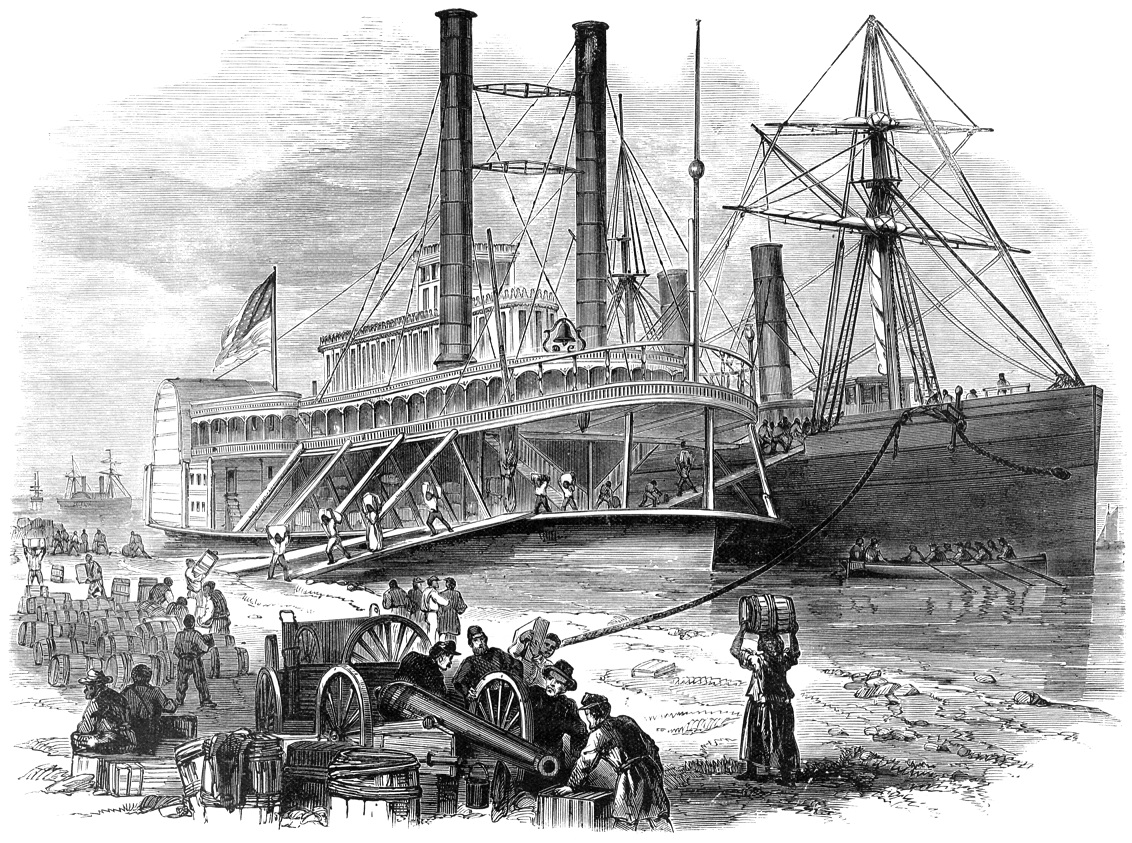
Workers unload supplies from the U.S. transport North Star across the steamer Iberville and to the shore at Baton Rouge.
I could not sleep long; and, soon after sunrise, was about again. I ate my light breakfast of bread and tea, and went again to the “Iberville’s” cabin. She was loaded above and below now, and about to start upon her voyage; but, while she waited, the surgeons and nurses were at work. Ambulances were from time to time arriving, bringing now many of the fine black fellows of Nelson’s regiment, which had passed the great test so well the day before.
The attempt to storm Port Hudson was unsuccessful; but something was done then to forward our cause, be cause it was on this day that black soldiers underwent their ordeal. Side by side with white troops, they were exposed to a hot fire, and bore themselves well. Col. Higginson, in South Carolina, has had his men under fire, to be sure; but his fighting has been of an irregular sort. Here, for the first time, they were exposed in a pitched battle; and their praise is in every mouth. I am glad I can write that the wounded blacks received all possible attention. They lay about the steamer wherever it was airy and pleasant. The surgeons were attentive. Barclay poured out the stores of the Sanitary and Christian Commissions without stint, and we nurses did all we could. I moistened many a black fellow’s wound; and where, as sometimes happened, they were stripped, that the surgeons might more readily reach their injuries, I adjusted the screens that kept off insects and the sun. They were never otherwise than full of patience and gratitude.
I also washed the wounds and the faces of the officers at the end of the cabin, and happened to be on hand to help in a very trying surgical operation. I held the leg of the young adjutant while Dr. L— cut a bullet out of the bones of the knee, in which it had become deeply embedded. It was a painful and critical operation. A few days before, I should have fainted at the sight; but, in such scenes, the sensibilities become blunted.
Every available foot of space now aboard the “Iberville” above and below, was filled with wounded men; and four nurses, I for one, were detailed to go with the boat to Baton Rouge. All were fed, above and below. We stood at hand with wet sponges and cooling drinks; and, meantime, the steamer with her sad freight slipped rapidly down the fifteen miles to Baton Rouge. Hospitals were prepared at the old Arsenal Buildings; and, as the boat rounded to, the intrenchments and banks everywhere were crowded with people.
The boat was soon emptied of its freight. I piled up the beds, as they were vacated, on one side of the cabin; and then had a little leisure to go ashore, and see a room or two of the permanent hospital. They looked neat and comfortable. The rooms were airy; the beds clean, and protected by mosquito-bars; the patients soon washed, and provided with food and fresh clothing. The steamer was presently on her way back. I managed to get a good dinner aboard; then spread a bed on the cabin-floor, and got an hour or two of welcome and needed sleep. I had worked very hard, and, I believe, gained the good-will of the surgeons. Besides, one or two old patients of mine, whom I had nursed in typhoid fever, had been at the landing, and, I believe, had spoken a good word for me. More and more responsibility was put upon me.
As soon as I had returned, the hospital-steward told me I was to take charge of removing a large number of wounded to the boat from the tents, who had been brought down from the field during our trip. Here were my negroes, here the nurses I could have, and here the stretchers. I went right to work. I had gained confidence, found my strength was good, and therefore was not afraid to handle even the worst cases. I dared to take hold of the stumps when it was necessary, the pierced hips, and lacerated shoulders. I had found that a quick, steady movement caused the least pain.
About dark … the task was accomplished, but only to make room for another; for now a longer string of ambulances than ever had come. The surgeons had gone to bed exhausted, and could not be disturbed. The hospital-steward was not to be found; and upon me came the responsibility of getting them all housed, fed, and cared for during the night. I had the beds laid in as good order as possible, working as I never worked before; then superintended, as well as I could, the removal of the men from the ambulances to the pallets upon the ground. It seemed as if we never had received a lot so dreadfully mangled: we certainly never received so many. With as much despatch as possible, I assigned to each his place. Commissary-teams were waiting for the ambulances to get out of the way; and we had almost to jump and run among the closely packed crowd on the floor, in the dim candle light. Outsiders, some of them officers, came in, but often hindered more than they helped, by misplaced sensibility, or unreasonable assumption of authority. The lightly wounded were to be put in the less accessible places under the eaves, as requiring least attention; the graver cases were to have the airiest beds; and the bodies of those who had bled to death in the ambulances had a place assigned to them in a tent out side. Barclay was at my right hand; a good man indeed. Together we took hasty counsel as to moving and making comfortable the more desperately injured. How could we take hold here so as not to jar the shattered lungs? And how, with this heavy, tall fellow, terribly hurt in the groin, how could I get my hands under the hips, so as to lift him most easily? We worked hour after hour, the sweat starting from every pore, that hot, moon-lit night, until every inch of available space was packed, and all were fed.
I do not know how many regiments were represented. There were officers of all grades. A colonel shot through the hand; a captain shot in the neck; and another, a gentleman, in the midst of his suffering, his elegant dress dusty and gory. I was hoarse with giving directions in the hubbub, and worn out with want of sleep. Toward daylight again, I found a place to lie down….
I got up from the ground before Barclay, soaked with sweat, and with dust and blood adhering everywhere. I apologized for my appearance; for it was my only shirt. He gave me another out of the Sanitary-Commission stores, in which I once more felt decent.
This was Friday, a day much like the previous ones. Besides the “Iberville” there were two or three other steamers to take the wounded; and, one after another, they went down stream freighted. During the day, we had a fine shower, which cooled the air. To dress a wound is no slight operation. To undo gaping injuries, wash them, stanch the blood; then do them up neatly, and feel they are safe, all this, one does not reach at once.
My hospital-service, however, was coming to a close. Saturday morning, began to arrive the Fifty-second Regiment. During the fortnight I had spent on my journey, and at Springfield Landing, they had per formed a march of one hundred and thirty miles; being part of the guard of the immense train in which the negroes and a vast portion of the wealth of the Teche and Opelousas neighborhoods were brought to the sea board. That work had been accomplished; and now, at the end of May, they had been hurried up the river to re-enforce the besieging army. Saturday afternoon, when the regiment passed the hospital on its way to the front, I bade Barclay and my old mates good-by, and fell in with the colors in my old place.”
Source
James K. Hosmer, The Color-Guard: Being a Corporal’s Notes of Military Service in the Nineteenth Army Corps (1864).
Related topics: medical care

